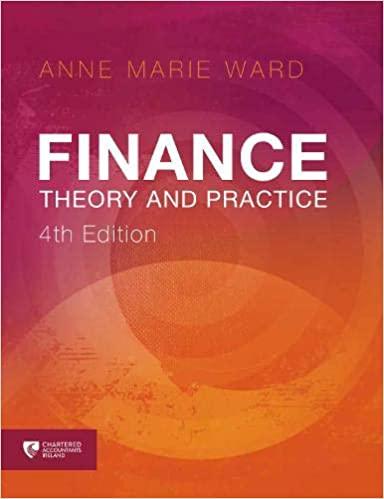Question
1.Which of the following would be considered an indirect agency cost? Multiple Choice The CEO of a company uses the corporate jet for a personal
1.Which of the following would be considered an indirect agency cost?
Multiple Choice
-
The CEO of a company uses the corporate jet for a personal vacation to Europe.
-
A manager makes an honest mistake that causes the company to write a check for $10,000.
-
A manager decides to pass up a project determined to be profitable to the company because he is afraid something might go wrong.
-
A fire at a company's largest factory causes a significant financial loss to the company.
-
A company's new product line is not selling as well as expected, causing a reduction in forecasted revenue.
2. Issuing stock options would have the greatest impact on reducing potential agency problems of which of the following?
Multiple Choice
-
Shareholders.
-
Upper management.
-
Custodial Staff.
-
Suppliers.
-
Support Staff.
3. Which of the following is NOT true about stock?
Multiple Choice
-
When you own stock, you own a piece of the ownership of the company.
-
A company cannot discontinue its dividend on common stock without the unanimous consent of the shareholders.
-
Stockholders have the right to have someone else vote their shares at annual meetings of a corporation.
-
Stock can also be referred to as "Equity".
-
Stockholders get to share proportionally in assets remaining after a liquidation.
4. Which of the following entities currently owns a majority of the shares of stocks listed on U.S. stock exchanges?
Multiple Choice
-
Warren Buffett.
-
Wealthy individual investors.
-
Professional athletes.
-
Institutions, primarily mutual fund companies.
-
Owners of financial media (television networks and publications such as the Wall Street Journal) companies.
5. Which of the following is NOT a right that accrues to owners of common stock?
Multiple Choice
-
First in line for assets when a company goes through a liquidation.
-
Pre-emptive Rights.
-
Proxy rights.
-
Right to share proportionally in dividends paid to holders of the same class of stock.
-
Right to vote on important company matters (unless explicitly stated otherwise in the Prospectus).
6. The date on which a bond contract ends and the stated amount of the final payment (as spelled out in the bond's Indenture) is made to bondholders is known as what?
Multiple Choice
-
Redemption.
-
Maturity.
-
Par Value.
-
Coupon.
-
Yield.
7. Which of the following is NOT a benefit of issuing stock rather than bonds?
Multiple Choice
-
It's often easier to sell stock than bonds as many investors find owning a piece of a company more attractive than simply loaning money to it.
-
All else equal, investors in stock tend to require less of a return for buying stock than they do for buying bonds.
-
Unlike with bondholders, a company has no obligation to make payments to shareholders.
-
Issuing stock tends to have a more favorable effect on liquidity than issuing bonds.
8. Which of the following is True about bonds?
Multiple Choice
-
Bondholders have an equal vote as shareholders when it comes to voting on important company matters.
-
Coupon payments may legally be withheld from being made to bondholders at the discretion of the Board of Directors.
-
Owning a bond does not give the bondholder an ownership stake in the company.
-
Following a liquidation, bondholders are behind stockholders in line to receive assets.
-
Bonds do not trade on the Secondary Market as stocks do.
9. Which of the following is the most likely reason an institution would be barred from owning non-Investment Grade bonds in certain investment accounts?
Multiple Choice
-
Because the institution relies on a fairly reliable stream of income from the account and cannot take on too much risk.
-
Because non-Investment Grade bonds tend to have lower Coupon Rates than Investment Grade bonds.
-
Because Investment Grade bonds tend to be riskier than non-Investment Grade bonds.
-
Because there are not enough non-Investment Grade bonds on the market to meet the needs of most large institutions.
10. Which of the following is true about Preferred stock?
Multiple Choice
-
It's "preferred" by most investors because investors usually make more money by buying preferred stock than they do by buying common stock.
-
Preferred stock carries more overall rights than common stock.
-
Preferred stock can only be purchased by investors who meet certain wealth criteria.
-
More analysts cover Preferred stock than common stock.
-
Preferred stockholders are ahead of common stockholders in receiving assets following a liquidation.
11. Which of the following best define "Pre-emptive Rights"?
Multiple Choice
-
Shareholders have the right to "preempt" bad decisions made by upper management before they are made.
-
Shareholders are allowed to have someone else vote their shares for them at shareholders' meetings.
-
Shareholders have the right to purchase enough shares of a new issue of stock to maintain their current percentage ownership of the company.
-
Shareholders can block the nomination of a person to the Board of Directors before the vote takes place.
-
Shareholders can block, or preempt, the issuance of a new series of bonds to prevent the company from getting into debt trouble.
Step by Step Solution
There are 3 Steps involved in it
Step: 1

Get Instant Access to Expert-Tailored Solutions
See step-by-step solutions with expert insights and AI powered tools for academic success
Step: 2

Step: 3

Ace Your Homework with AI
Get the answers you need in no time with our AI-driven, step-by-step assistance
Get Started


